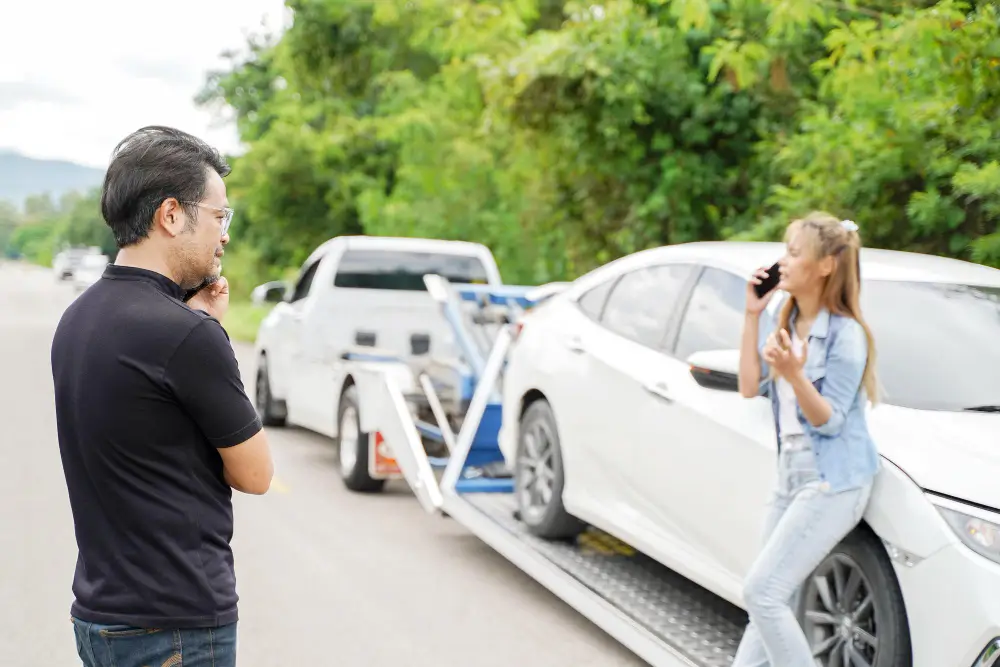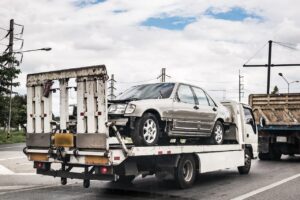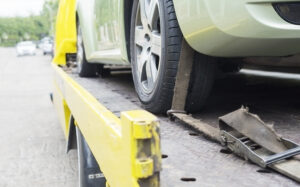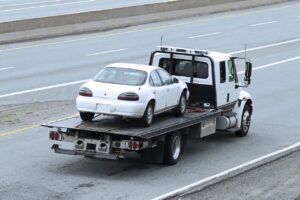Electric vehicles are transforming the roads of St. Louis, with more drivers making the switch to battery-powered transportation each month. These innovative vehicles present unique challenges when it comes to towing and roadside assistance situations. Unlike conventional vehicles, EVs have specific requirements that demand specialized knowledge and equipment to prevent costly damage to their electrical systems and drivetrains.
At Reliable Guys Towing Service, we’ve adapted our services to meet the growing needs of electric vehicle owners throughout the St. Louis metro area. If you need towing services for your EV, call us at (314) 325-1016 for prompt, knowledgeable service.
In this guide, we’ll explore why EVs require special towing considerations, why flatbed towing is preferred, what to do in emergencies, options for reaching charging stations, and important insurance considerations for St. Louis EV owners.
Why Electric Vehicles Require Special Towing Considerations
Electric vehicles differ fundamentally from their gasoline-powered counterparts in ways that significantly impact how they should be towed. The most critical difference lies in their drivetrain components and how they interact even when the vehicle isn’t running.
Drivetrain Differences and Concerns
Many EVs use regenerative braking systems and have electric motors directly connected to the wheels. When these wheels rotate during traditional towing (where two wheels remain on the ground), they can potentially generate electricity that flows back into the system. Without proper precautions, this can damage vital components like the motor or power electronics.
Tesla, for instance, explicitly warns against traditional towing in their owner’s manuals, noting potential “serious damage” can occur. Similarly, Chevrolet advises Bolt owners that their vehicles should only be transported with all four wheels off the ground. Nissan Leaf documentation contains comparable warnings.
Battery and Component Vulnerability
Another consideration is the location of critical components. Many EVs have battery packs that run along the underside of the vehicle, making them potentially vulnerable during improper lifting or towing procedures. Even seemingly minor errors during the towing process can lead to expensive repairs that might not be covered under warranty if manufacturer guidelines weren’t followed.
This doesn’t mean your EV is more fragile than a conventional vehicle. It simply requires different handling techniques that respect its unique design and engineering.
Flatbed Towing: The Preferred Method for Electric Vehicle Transportation
When it comes to safely transporting electric vehicles, flatbed towing stands out as the gold standard recommended by virtually all EV manufacturers. But what makes this method so advantageous for electric vehicles?
Why Manufacturers Recommend Flatbed Towing
A flatbed tow truck allows your entire vehicle to rest securely on a flat platform with all four wheels off the ground. This completely eliminates any risk of mechanical components rotating during transport, preventing potential electrical generation and system damage. The vehicle remains in a neutral state throughout the journey.
For popular models like the Tesla Model 3, Model Y, and Model S, manufacturer guidelines explicitly specify flatbed towing as the preferred method. Similarly, the Chevrolet Bolt, Nissan Leaf, and Ford Mustang Mach-E all have comparable recommendations in their service documentation.
The Protection Factor
Beyond drivetrain protection, flatbed towing offers additional advantages for electric vehicles:
- It prevents potential damage to the undercarriage and battery compartments by avoiding dragging or improper lifting
- It eliminates stress on suspension components that can occur with wheel-lift methods
- It provides better vehicle stability during transportation, especially important given the heavy battery packs in many EVs
- It reduces the risk of secondary damage that might occur if the vehicle shifts during transport
For St. Louis EV owners, who often travel between Missouri and Illinois on our region’s varied roads and highways, the stability provided by flatbed transportation offers valuable peace of mind.
Emergency Situations: What St. Louis EV Owners Should Know
Even with meticulous maintenance, emergency situations can arise. Knowing how to respond when your electric vehicle needs assistance in the St. Louis metro area can save you time, money, and stress.
Battery Depletion Scenarios
One unique challenge for EV owners is complete battery depletion. If your vehicle runs out of charge on a St. Louis highway or city street, you generally have two options:
- Emergency charging: Some roadside assistance services offer limited emergency charging that can provide enough power to reach the nearest charging station. However, this service has limited availability in our region.
- Towing to a charging station: More commonly, you’ll need transportation to the nearest compatible charging location. In these cases, flatbed towing is the safest option to protect your vehicle’s systems.
Accident Response for EVs
If your electric vehicle is involved in an accident, additional safety protocols come into play. The high-voltage systems in EVs require special handling. Emergency responders in the St. Louis area receive training for EV accidents, but as the owner, you should:
- Clearly communicate to first responders and towing professionals that your vehicle is electric
- Follow manufacturer shutdown procedures if it’s safe to do so
- Be aware that damaged battery systems can pose fire risks that may not be immediately apparent
- Ensure that only qualified professionals handle your vehicle
In any emergency situation, clearly communicating that you have an electric vehicle when you call for assistance helps ensure the proper equipment and expertise are dispatched to your location.
Towing to Charging Stations: A Unique EV Challenge
The St. Louis metro area has seen significant growth in charging infrastructure, but gaps still exist, particularly in certain parts of Illinois and in some outlying areas of Missouri within our region. This creates unique challenges when battery levels run critically low.
St. Louis Charging Infrastructure Overview
The St. Louis region currently offers several types of charging options:
- Level 1 charging (standard household outlet) – widely available but extremely slow
- Level 2 charging stations – found at many shopping centers, parking garages, and workplaces
- DC Fast Charging stations – less common but provide the fastest charging option
Despite this growth, “charging deserts” still exist in parts of our region, particularly in areas between major transportation corridors.
When You Can’t Reach a Charging Station
If you find yourself unable to reach a charging station, professional towing becomes your best option. Rather than risking battery damage by trying to extract the last mile from a critically low battery, having your vehicle safely transported to the nearest compatible charging station protects your investment.
For longer trips starting from St. Louis, planning becomes essential. Many EV owners map out charging locations before departing, but unexpected closures or malfunctioning stations can still create challenges. Having the contact information for a reliable towing service that understands electric vehicles provides valuable backup.
Insurance Considerations for Electric Vehicle Towing in Missouri and Illinois
Understanding how your insurance covers EV towing can save you from unexpected expenses and complications, especially in the bi-state St. Louis region where policies may have different provisions.
Coverage Basics for EV Owners
Most standard auto insurance policies include some form of roadside assistance, but coverage limits and specific provisions for EVs can vary significantly. Key points to understand include:
- Some policies limit the number of roadside assistance calls per year
- Towing distance limits may apply, which can be problematic if the nearest compatible charging station is far away
- Specialized EV roadside services might not be included in standard coverage
In Missouri, insurance requirements differ somewhat from Illinois, which can create confusion for St. Louis metro residents who regularly cross the Mississippi River. It’s worth checking whether your policy has any limitations that apply when crossing state lines within our metro area.
Documentation Recommendations
To avoid complications when filing claims, we recommend St. Louis EV owners:
- Keep digital and physical copies of your vehicle’s towing requirements from the manufacturer
- Document any towing events with photos before and after
- Retain all receipts and service documentation
- Clarify with your insurance provider exactly what EV-specific towing services are covered
Taking these simple steps can streamline the reimbursement process and help ensure you’re not left with unexpected expenses.
Protecting Your Electric Vehicle Investment
As electric vehicles grow in popularity throughout St. Louis, understanding proper towing methods becomes increasingly important. The unique design of EVs requires specific handling techniques that differ from conventional vehicles. Flatbed towing offers the safest transportation method, protecting sensitive components from potential damage.
At Reliable Guys Towing Service, we’ve invested in the proper equipment and training to safely transport electric vehicles throughout the St. Louis region. Whether you’re in Missouri or Illinois, call us at (314) 325-1016 for knowledgeable EV towing service. By understanding your electric vehicle’s specific needs and knowing your insurance coverage details, you can protect your investment and enjoy greater peace of mind as you embrace the future of transportation.




